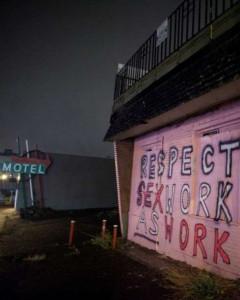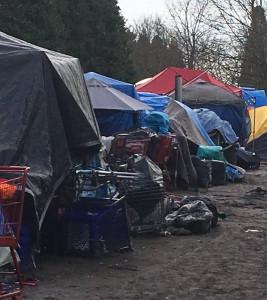Those of you who follow me on Twitter may remember that on several occasions I’ve tweeted GoFundMe appeals for homeless sex workers, organized by a close friend of mine who does street outreach. Recently, I asked her to write something for me so that in future, I can point back to it to explain who it is I’m asking charity for. This lady is a Seattle sex worker who is well-known in our community, but prefers to remain anonymous for her activism. If you’d like to help her out (because she does 95% of this out of her own pocket), please let me know and I’ll arrange a way for you to donate to her important work.
Like so many things in this industry, it started with Kristen D’Angelo, who contacted me because her friend from Sacremento had a daughter living in Seattle. Kristen’s friend was concerned his daughter was working on the streets and was hoping to get someone to check on her; she (let’s call her Jess) was homeless, using drugs, and working on Aurora Avenue. Maggie and I ended up taking her out for dinner. More than anything, she was surprised that instead of being met with judgment and Jesus, she was met by peers with compassion and kindness (along with some screening tips for seeing clients). Shortly thereafter, I found out an acquaintance of mine had lost her housing, and she and her boyfriend were living out of their car. I would go see her once, occasionally twice, a week, bringing lunch or dinner, and we would eat together and talk. After a couple visits I starting meeting some of the people that they had befriended in their time on the streets. I was struck by the situations of the women there. To see women so vulnerable was terrifying…but I wasn’t sure what I could do. I asked them: what do you need? How can I help? While I don’t have a tremendous surfeit of disposable income, I could certainly spend $100 a week buying food for people that badly needed it. So I did.
Simultaneously, I was keeping in (more sporadic) contact with Jess. It wasn’t long before I was heading up to Aurora once a week (give or take) as well. Eventually I was out two or three nights a week talking to young women from Aurora to Belltown to SoDo, both in the jungle and working the streets. I found myself out at 7pm, 10pm, or midnight walking through the city, talking to people. Instead of being in Greenlake or Madrona, I found myself in places with appellations like the Batcave and Clowntown; I was under the viaduct and in tent cities along the highway. Within this world, it takes time to earn trust; there are always, to this day, some women that refuse to talk to me or that I have met five times but act as if they don’t know me…and that’s fine. For the ones that do talk, I hand out condoms and Narcan. I bring jackets, food, toiletries, clean socks, and camping propane tanks. I take girls to Planned Parenthood for panel tests; to emergency shelters; to drop them off at detox. Many of them, if you asked, would not identify as a sex workers, and if you called them a sex worker, you might get punched in the face. But, if you said, “if you give me a blowjob, you can sleep in my tent tonight.” Well, that’s an easy yes!! Whether they identify as sex workers or not, they know when they see me that religion isn’t coming into the conversation and I am not going to tell them what they should do or have to do. Giving these women autonomy in their decision-making is very important; even when, in my opinion, they may make a terrible choice, it’s theirs to make and I won’t try to take that away from them. Similarly, none of the things I hand out have strings attached; the only rules are I will not give out cash or buy drugs.
 When I meet women that are open to talking, I may make some harm reduction suggestions or ask them what they need. Much of the time, I listen. Many of these women have suffered extensive trauma, have drug abuse issues (the desire to anesthetize a terrible situation is strong), or have mental health problems – or all three. In addition, there is the pervasive sense of hopelessness that comes with being utterly marginalized and, in effect, thrown away by society; just having someone listen and acknowledge you can be significant. It definitely isn’t the easiest volunteer path I could have taken. There have been multiple calls from girls that have been raped, assaulted, or robbed. I helped a girl that had been thrown out of a moving car by a client, and another girl that was pistol-whipped by her boyfriend. I’ve Narcan’d people through countless overdoses (if anyone ever needs to be resuscitated – I am a fucking pro). I’ve been hung up on by police when calling 9-1-1 for help and been told by the paramedics that they “can’t” go where they are needed. I’ve stepped over dead bodies and had rats the size of Boston Terriers leisurely swagger over my toes.
When I meet women that are open to talking, I may make some harm reduction suggestions or ask them what they need. Much of the time, I listen. Many of these women have suffered extensive trauma, have drug abuse issues (the desire to anesthetize a terrible situation is strong), or have mental health problems – or all three. In addition, there is the pervasive sense of hopelessness that comes with being utterly marginalized and, in effect, thrown away by society; just having someone listen and acknowledge you can be significant. It definitely isn’t the easiest volunteer path I could have taken. There have been multiple calls from girls that have been raped, assaulted, or robbed. I helped a girl that had been thrown out of a moving car by a client, and another girl that was pistol-whipped by her boyfriend. I’ve Narcan’d people through countless overdoses (if anyone ever needs to be resuscitated – I am a fucking pro). I’ve been hung up on by police when calling 9-1-1 for help and been told by the paramedics that they “can’t” go where they are needed. I’ve stepped over dead bodies and had rats the size of Boston Terriers leisurely swagger over my toes.
The other side is that there are happier stories. I paid out my own pocket for a girl to go to rehab because I believed in her when no one else did; she completed 90 days of treatment and moved back to her parent’s house in Minnesota. That was over a year ago and she is still clean and sober. Two girls had been living in and out of motels on Aurora and we worked together to get them into a low-income apartment; two other girls saw what they did and decided they could do it too. I’ve acted as an advocate for a girl that was brutally raped by a prominent Seattleite; I connected her with a lawyer and could not have been happier for her when she got a ridiculously large settlement. Money didn’t make the PTSD disappear, but it certainly put her in a situation where she could take time and heal. Unfortunately, the stories with (ahem) happy endings are exceptionally few and far between; the emotional labor can be intense, overwhelming, and exhausting. I’ve asked myself more than once why I’m not walking dogs at the Humane Society, and I have spent more hours than I can count crying on Maggie’s couch. But I very strongly believe that everyone needs some help now and then; if I can help someone make a more informed decision or turn a corner, then it’s worth it.
